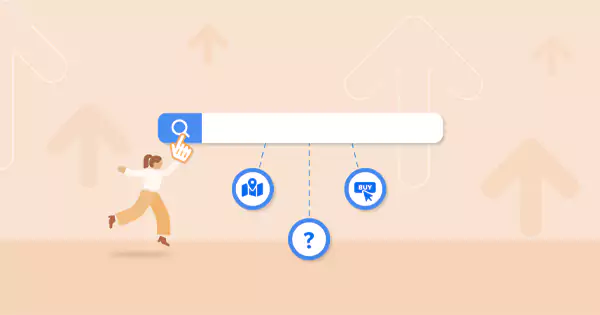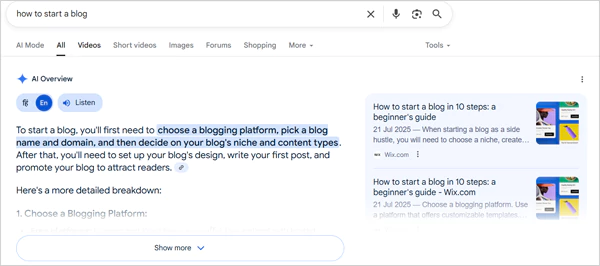
We are in the digital era, where AI search is evolving faster, making important changes in how people find information online. Accordingly, some beneficial tools like ChatGPT, Google’s AI Overview, and other smart systems are helping users to get quick and direct answers.
But even with this prominent transformation, traditional search engine optimization (SEO) is far from dead. The website on the search engine still needs strong content, effective keywords, and smart SEO strategies to reach its end goals.
Therefore, I will guide you on how AI search is rising, what it means to the users, and why SEO still plays an important role in online expansion.
The Rise of AI-Powered Search Engines
AI search engines are becoming more popular mainly because they provide instant, easy-to-understand, and accurate answers to their users within seconds.
Statistic: According to a 2024 report by Statista, over 57% of global internet users have used AI-driven search tools at least once, up from 39% in 2023.
Likewise, these smart tools make use of some technologies like natural language processing (NLP) and machine learning to comprehend what their users are looking for.
Instead of matching the query keywords, AI tries to figure out the exact meaning behind the search to provide more helpful and complete answers. So, it feels more like a conversation than just a list of links.
For instance, if you search, “What are the best shoes for running in 2025?” an AI search tool will quickly give you the names with their summary, price, and features. After which, you didn’t have to click on multiple websites to find your match.

Because of this, platforms like ChatGPT, Bing AI, Google’s SGE, and Perplexity are becoming the most commonly used search tools for many people these days.
Therefore, as users are relying more on AI to search, businesses and content creators need to adapt to these changes to keep up with this constant change to grow.
SEO’s Resilience Amidst Technological Disruption
Even with the fast growth of AI-powered search tools, search engine optimization (SEO) continues to be a powerful part of digital marketing.
While AI tools are reshaping searches on the internet, SEO is adapting and updating, not disappearing anytime soon. Moreover, according to HubSpot’s 2025 report, more than 70% of marketers still think that SEO is a top source of organic traffic.
This shows that no matter how much technology evolves, strong SEO practices are still delivering results and helping businesses to establish a strong virtual presence.
For example, a well SEO optimized page will help the AI search tools to understand what the content is about. Similarly, if the blog post answers the users’ queries using the relevant keywords, it’s more likely to be picked by the AI search system.
Therefore, we can say, sites that provide original, helpful, and trustworthy content to the audience can continue to rank, whether it’s through traditional SEO or AI platforms.
Briefly, SEO is no longer about stuffing keywords in your content; it has become a helpful strategy by which you can work on user experience, structured data, and quality content.
As AI continues to grow, experts are learning to work along with it, proving that good SEO can survive and eventually provide beneficial assistance even in an AI-driven world.
More Interesting Stats
- BrightEdge’s 2024 Digital Marketing Survey revealed that 68% of marketers still consider SEO their most cost-effective digital strategy.
- According to SEMrush (2025), organic search still drives 53% of all trackable website traffic.
AI Search Engines Still Depend on SEO Content
Behind every smart artificial intelligence answer you get from the AI-powered platforms is a piece of content that someone has published on their blog or website.
A 2025 analysis by Ahrefs found that 92% of top-performing AI search snippets originate from SEO-optimized websites.
Likewise, AI search engine tools don’t create facts on their own; they always collect, learn, and summarize the information from the millions of web pages written by real people.
This is exactly where search engine optimization plays a vital role; without SEO-friendly content, AI wouldn’t get the precise and structured data to provide an accurate answer to its users.
For example, if the blog post is structured in a well-organized way, using the relevant keywords, and answering the questions directly is more likely to be pulled by the AI tools.
Ahrefs’ 2025 reports show that 92% of the content used in the AI overview comes from content that follows strong SEO strategies in their website functionality.
Consequently, this shows that even though these days AI search feels innovative and future-oriented, it still relies on the basics of SEO to function effectively.
Therefore, if you are a content creator or a marketer, you must continue to focus on clear and optimized content to stay visible, both to traditional search engines and AI tools.
The Changing Nature of User Intent and Content Strategy

Nowadays, people are no longer just looking for simple keyword matches; they want clear, useful, and personalized answers to their queries without waiting for too long.
This massive shift in user behavior is changing how blogs need to be created on the internet. Instead of focusing only on keywords, now content writers pay closer attention to user intent and the real reason behind a search.

For example, when you search “how to start a blog” on a search engine, you will not only get the definition for it. AI-powered tools like Google AI Overview will also provide you with a step-by-step guide, tips, tools, and even common mistakes you must avoid.
Likewise, to meet this match, the content must be better organized, informative, and include follow-up questions, all in one place. Thus, this transition is even more important because of the rise of AI-powered search engines.
Moving further, according to the 2025 HubSpot marketing reports, 70% of marketers are now reshaping their content strategies to meet their users’ requirements more comprehensively.
All in all, comprehending what people are looking for and delivering the answer in a clear and helpful way is now the sole strategy by which you can create successful content.
Moreover, it’s not just about ranking anymore; nowadays, solving problems and guiding users with value-driven content is what actually succeeds.
Conclusion
Wrapping up! Artificial intelligence may transform the method of people searching for information on the internet, but it hasn’t replaced the requirement for smart SEO techniques.
In fact, it’s pushing creators to do better, with clearer writing, sticking to the main purpose, and being helpful. Similarly, SEO is no longer just about ranking higher; it’s about being chosen by both users and AI systems for relevance and authenticity.
However, no matter how much the technology is evolving, the goal of search engines remains the same: helping the audience narrow down what they are looking for.
Remember, this is not the end of SEO; it’s the start of a smarter and more meaningful way to create content!










